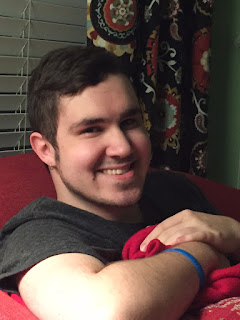I don’t watch much network
television. I do, however, have my few
guilty pleasures that I record and watch later.
One of those is Shark Tank. I
come from an entrepreneurial family so I love to evaluate the opportunities
presented and have bought some of the products pitched on the show. Today, the episode included a pitch by a
father/son team for a guitar with a folding neck. I immediately called my son in to watch with
us since he is a musician and has been obsessed with guitars since age two.
A couple of the sharks ended up
making an offer which the team refused.
It was a licensing deal where they would sell the patented hinge to the established
guitar manufacturers. The father would
have had to give up 51% control of the company, however, and so he didn’t
accept. I asked Benjamin if this guitar
was on the market anywhere. He wasn’t
sure and he questioned the practicality since the guitar sounded out of tune
before and after they folded it (I couldn’t tell) and that folding guitar strings
is like folding a paperclip back/forth – not good. But what inspired me today was the rest of
our conversation. He said plainly, “The
guitar industry sucks.” He went on to
explain that the guitar industry is built on tradition so innovation is not
valued. Even if a guitar is designed to
address say, the problem with reaching the frets easily, musicians are
skeptical. Apparently, Gibson built such
a guitar for a few years, sold the heck out of it, and then discontinued
it. Maybe they are creating
scarcity. Benjamin said the most
expensive guitars are the replicas of the older designs.
This made me think about
scotch. I know what you’re thinking –
where’s the Jesus? Stay with me. At one time, I really enjoyed drinking
scotch. If you are a scotch drinker, my
favorite was Oban, one of the smallest distilleries in Scotland, started in
1794. When I drank Oban, I expected it
to taste consistently the same year after year.
As a consumer, I would have probably stopped buying Oban if they did
anything “innovative” with their product.
So it is with guitars, apparently.
Everything about the way guitars are made produces a very unique
sound: whether the neck is glued on or
screwed on; whether the wood is solid or composite; whether there are three
springs or five springs on the bridge, etc.
[I know more than I really want to know about guitars but I totally
support my son in his passion.] As I
listened to my son, I understood that so much of the value comes from
consistency and not innovation. The car
industry is built on innovation but not guitars or scotch. I named it the Stradivarius Syndrome – that
unless it’s done exactly the same way it’s always been done, it’s not worthy.
That’s when my palms started to
sweat. Isn’t the church something that
we value for its tradition and we become skeptical when it doesn’t
look/smell/feel/sound like it always did? When
I said this, my husband commented that Jesus and God don’t change – they are supposed to be the same forever. I agreed.
The Trinity – God, Jesus, Holy Spirit – are constant. That’s the beautiful and comforting
thing. But how we expand His kingdom is
always ripe for experimentation. There
are no limits as to the many ways we can reach out to people and connect them
to the church. God gave us the gift of
creation – the ability to create something from nothing. We aren’t creating the Trinity; we are
creating a community.
Does the experience of church
look the same as it did years ago?
No. Does it feel the same from
church to church? No. And it is still worthy. As I talk to our younger newcomers at St.
Mary’s, I am surprised by their desire for reverent worship, time for prayer,
or organ music. They say they are tired
of 30 minute rock concerts. As I write
this blog, I can smell my mother’s communion bread baking for tomorrow’s Holy
Eucharist. Our liturgical tradition is a
real and physical experience in a world where we constantly need to filter
truth from fiction.
Traditionally, we have waited for someone to decide they wanted to
join the church before helping them connect in any significant fashion. I believe in the opposite. People don’t join anything before they have a
connection to it. Our first Seekers
Forum concluded a few weeks ago. This
was a blend of some in-person fellowship and a private Facebook group. Personally, this is not the way I would
connect to a new church but it was very meaningful to these participants. That is one example of innovation and we
didn’t have to abandon our Anglican roots to do it.
It’s scary to experiment and try
something new. But if we try something
new because we are truly listening to others and trying to meet them where they
are, the church becomes real and relevant.
And that is both traditional and innovative.



